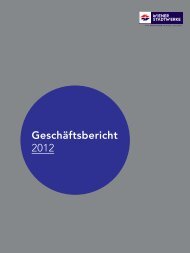Wiener Stadtwerke Annual Report 2012
You also want an ePaper? Increase the reach of your titles
YUMPU automatically turns print PDFs into web optimized ePapers that Google loves.
Consolidated<br />
Management <strong>Report</strong><br />
for the <strong>2012</strong> financial year<br />
1. Operations<br />
The <strong>Wiener</strong> <strong>Stadtwerke</strong> Group is a modern infrastructure provider<br />
and one of the largest conglomerates, investors and employers in<br />
Austria. Its commercial activities can be broken down into the<br />
segments energy, transport, funerals and cemeteries, and car<br />
parks. The energy segment covers the areas of production,<br />
network operation and sales, whereby the main focus is on<br />
ensuring reliable supplies of electricity, gas and district heating.<br />
<strong>Wiener</strong> <strong>Stadtwerke</strong> also provides a comprehensive range of<br />
services in the area of public transport (transport segment:<br />
<strong>Wiener</strong> Linien and <strong>Wiener</strong> Lokalbahnen), funerals and cemetery<br />
administration, as well as car parking facilities. The high quality,<br />
reliable and safe services offered by the Group make an important<br />
contribution to the very high quality of life enjoyed in the city;<br />
something which is recognised internationally and has also been<br />
attested by studies.<br />
2. Legal environment and other circumstances<br />
The segments of the <strong>Wiener</strong> <strong>Stadtwerke</strong> Group largely have to<br />
operate in deregulated or regulated environments. While, for<br />
example, the sales markets in which the energy segment<br />
operates have been fully deregulated, the setting of tariffs for<br />
the electricity and gas networks continues to be decided upon<br />
by a public-sector regulator. The funerals market in Austria was<br />
deregulated as early as 2002. The transport segment has been<br />
able to benefit from the deregulation of the freight transport<br />
market but remains subject to several special provisions<br />
pertaining to short-range public transportation.<br />
specifics of the <strong>2012</strong> financial year<br />
Change of the balance sheet date of the energy segment<br />
With effect from 31 December <strong>2012</strong>, the balance sheet dates<br />
of affiliated companies within the <strong>Wiener</strong> <strong>Stadtwerke</strong> Group<br />
were harmonised. Besides optimising Group-wide processes,<br />
particularly those in the area of finance, this will also reduce<br />
the level of complexity associated with financial reporting. The<br />
period between 30 September <strong>2012</strong> and 31 December <strong>2012</strong><br />
will be reported in the separate financial statements of the<br />
Group‘s energy segment subsidiaries as a short fiscal year. In<br />
the financial statements of the <strong>Wiener</strong> <strong>Stadtwerke</strong> Group,<br />
however, the energy segment will take into account, on an<br />
exceptional basis, five quarters. From a commercial perspective,<br />
one quarter has been regained which was excluded from<br />
reporting when 30 September was introduced as the balance<br />
sheet date back in 2002, when only three quarters were<br />
reported for the energy segment in the consolidated annual<br />
report of the <strong>Wiener</strong> <strong>Stadtwerke</strong> Group.<br />
10 <strong>Annual</strong> <strong>Report</strong> <strong>2012</strong> | Consolidated Management <strong>Report</strong><br />
Change in the valuation method applied to provisions for<br />
pension obligations<br />
In the course of an earlier assignment of pension obligations<br />
from the City of Vienna to <strong>Wiener</strong> <strong>Stadtwerke</strong>, the latter<br />
assumed these obligations for a total of 7,400 employees,<br />
excluding <strong>Wiener</strong> Linien. Of these 7,400 employees, around<br />
2,700 are still active for the Group and 4,700 already<br />
pensioned. The provisions for pensions were calculated at<br />
31 December 2011 in accordance with IAS 19 (Employee<br />
Benefits) applying the projected unit credit method and the<br />
corridor method.<br />
Due to the revision of IAS 19 decided upon by the International<br />
Accounting Standards Board (IASB) on 16 June 2011 and<br />
subsequently adopted by the EU on 5 June <strong>2012</strong>, the corridor<br />
method for reporting pension obligations, applying the<br />
projected unit credit method, is no longer applicable to<br />
financial years starting on or after 1 January 2013.<br />
The effects of the revision of IAS 19 on the presentation of the<br />
asset, financial and earnings positions provide a well founded<br />
exceptional reason for a deviation from the principle of<br />
valuation consistency.<br />
On a voluntary basis, the <strong>Wiener</strong> <strong>Stadtwerke</strong> Group has<br />
applied the revised approach at an earlier point in time and<br />
has recognised the provisions for pension obligations as at<br />
31 December <strong>2012</strong> applying actuarial principles on the basis of<br />
the entry-age normal method. The calculation applied an<br />
assumed interest rate of 2.5 percent (real interest rate) due to<br />
the current interest-related environment during the <strong>2012</strong><br />
financial year.<br />
This led to additional funding requirements amounting to<br />
EUR 745.4 million. Following these changes to the valuation<br />
method and the interest rate, the provisions amount to<br />
EUR 3 billion, equivalent to around 22 percent of the consolidated<br />
balance sheet total.<br />
Legal environment and other circumstances<br />
The Green Electricity Act <strong>2012</strong> (ÖSG <strong>2012</strong>) came into effect on<br />
1 July <strong>2012</strong> and is aimed at increasing the share of renewable<br />
energy in the electricity mix in Austria and, as a result, at<br />
eliminating the country‘s dependence on imported electricity<br />
generated by nuclear power by 2015.<br />
The Vienna Electricity Act (WElWG) was amended (Vienna<br />
Provincial Law Gazette, No. 44/<strong>2012</strong>) in order to comply with<br />
the underlying stipulations of the Electricity (Industry and<br />
Organisation) Act (ElWOG <strong>2012</strong>). Major regulations were<br />
imposed to bolster and safeguard consumer rights, to<br />
effectively unbundle network operators, to stabilise electricity<br />
supplies by means of network development and expansion<br />
plans, as well as to consolidate networks in order to create<br />
regulation areas and to introduce additional monitoring tasks<br />
for the provincial government.<br />
In June <strong>2012</strong>, the EU Member States reached agreement on<br />
new binding regulations to increase energy efficiency in order<br />
to reduce energy consumption by 20 percent by the year 2020.<br />
With the aid of this directive, Member States are required to




